RUSH: Look, it’s one of the many things I could throw out there. And, if you’re looking for signs, let’s face it, many of you are looking for signs of a Trump win, right? Many of you are looking for signs of a Trump landslide. Let’s be honest. Many of you are hoping that this is a Trump slam dunk the likes of which nobody in the media has even considered to be possible. I know you’re out there. I know who you are. There’s tons of people that want that to happen. There’s tons of people who think that it might.
Greetings, and welcome back, Rush Limbaugh, executing assigned host duties flawlessly, zero mistakes. That’s because I’m host and I assign the duties. Therefore, I couldn’t possibly make any mistakes. Telephone number, 800-282-2882, and the email address, ElRushbo@eibnet.us.
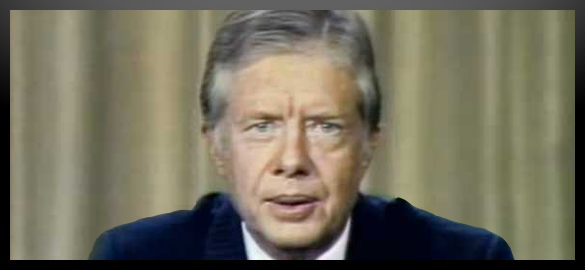 Now, let’s go back to something I mentioned yesterday. This is an important point to remember that Pat Caddell made. He was Jimmy Carter’s pollster, 1980. That was the year that Carter was expected, the last poll showed Carter winning by 9 and the election was over by 8 o’clock Eastern time. They had called it for Reagan even before California closed, even before Midwestern states had closed, in some cases. And Reagan went on to win a huge 49-state landslide. Nobody saw it. The polls did not project it.
Now, let’s go back to something I mentioned yesterday. This is an important point to remember that Pat Caddell made. He was Jimmy Carter’s pollster, 1980. That was the year that Carter was expected, the last poll showed Carter winning by 9 and the election was over by 8 o’clock Eastern time. They had called it for Reagan even before California closed, even before Midwestern states had closed, in some cases. And Reagan went on to win a huge 49-state landslide. Nobody saw it. The polls did not project it.
Caddell and even Doug Schoen, who’s a lifetime Democrat pollster and strategist, worked for Hillary in the nineties, Bill and Hillary in the nineties, he and Caddell both have said this has a 1980s feel, this election, because there are a lot of similarities. Reagan was an outsider. He was governor of California, but he was not taken seriously by either party in the establishment. The Democrats thought Reagan was just a buffoon much like they think Trump is. They didn’t think Reagan was vulgar or any of that; they just thought he was lightweight, embarrassing know-nothing.
They thought conservatism was this kooky, oddball way of looking at things that nobody could understand and nobody would ever support. They thought everybody loved Jimmy Carter. They were willing to think that Carter would continue to be supported because people loved him from Georgia, loved his Southern accent, loved that he was trying hard. Never mind the economy was in a disaster, a much more admitted disaster.
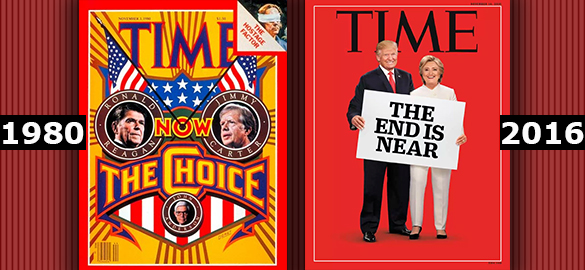 We have an economic malaise today. The economy of 1979, 1980 was an admitted disaster no matter who you talked to, the Democrats, the media, it was a disaster. We had unemployment double digits. We had interest rate double digits. It was just absolute horrible, even created this term “malaise,” the misery index to describe it. Well, to many people the economy today is close to that, but it’s different in that even back then we didn’t have nearly the safety net we have today.
We have an economic malaise today. The economy of 1979, 1980 was an admitted disaster no matter who you talked to, the Democrats, the media, it was a disaster. We had unemployment double digits. We had interest rate double digits. It was just absolute horrible, even created this term “malaise,” the misery index to describe it. Well, to many people the economy today is close to that, but it’s different in that even back then we didn’t have nearly the safety net we have today.
We’ve got 94 million Americans not working, but they’re all eating, and that fact alone means that they’re not automatically going to vote against the people who’ve made the economy derelict. If you’re unemployed and you got a phone, you got a big screen, you got a car and you’re eating, then what really is there to be mad about, versus 1980, you’re out of work, you had your unemployment check for couple weeks and that was it. It was bad.
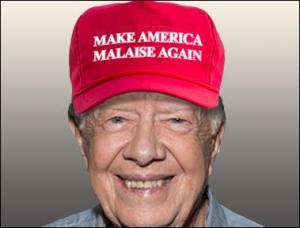 But the big difference between 1980 and today is early voting. There wasn’t any early voting in 1980, and therefore the late-minute, this out-of-nowhere surge for Reagan came as a total shock and a surprise. Both Caddell and Doug Schoen say that such a repeat, even though we have a similar feel in that we’ve got an outsider who could come from nowhere and shock everybody, the odds of it being a shock and a surprise are way, way down because of early voting. The early voting, these guys say, represents what was the late-breaking, overwhelming support for Ronaldus Magnus back in 1980.
But the big difference between 1980 and today is early voting. There wasn’t any early voting in 1980, and therefore the late-minute, this out-of-nowhere surge for Reagan came as a total shock and a surprise. Both Caddell and Doug Schoen say that such a repeat, even though we have a similar feel in that we’ve got an outsider who could come from nowhere and shock everybody, the odds of it being a shock and a surprise are way, way down because of early voting. The early voting, these guys say, represents what was the late-breaking, overwhelming support for Ronaldus Magnus back in 1980.
But even at that, I know that there are many of you who are thinking that, no, the early voting still hasn’t captured the people we’re talking about. The people we’re talking about, the people that haven’t registered to vote either their whole lives or in a long time, and they’re out there, and the pollsters haven’t really found them, and they’re showing up in droves today, that’s who they are. They’re not early voters. They’re showing up today and they’re gonna shock the world. There are a lot of people.
So if that were to happen — let’s take the hypothetical — what could drive it? Obvious answer, insider versus outsider, elites, ruling class versus country class. The people you’re talking about that you expect to show up or hope you expect to show up in droves are people that don’t think their vote counts, don’t think the political system is real. They think it’s all rigged by the people that run it. That no matter who they elect and no matter what they support, the elites that run the show are never going to suffer, they’re never gonna lose, they’re always gonna arrange things so that no matter what the election results are, their way of life never changes and their degree of power never changes.
And you can’t blame ’em. That’s a cynical view that a lot of people have, but you can’t blame ’em ’cause in many cases is right. The ruling class is the ruling class. The elites are the elites. Who are the elites and ruling class? Let’s name them. We’re talking about Wall Street investment firms, banks, Big Wealth. We’re talking about subdivisions of Big Wealth such as Big Oil, Big Hollywood, Big Pharmaceutical, big crony corporate interests that have sidled up to government as a partner because they find it easier to compete with their competitors when their competitors are not partnering with government, and they are. Examples would be GE, Walmart, Goldman Sachs.
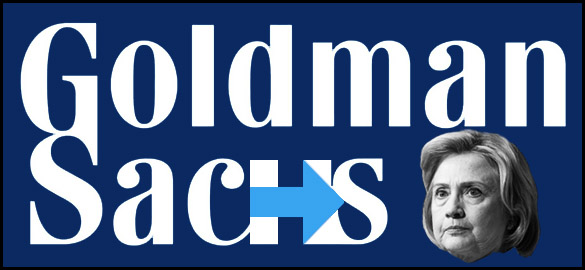 Hillary Clinton, the Democrats campaign as though they represent the little guy, the downtrodden, the middle class, lower middle class, but they’ve forgotten them. White working-class voters have been totally thrown overboard by the Democrat Party. That’s who Hillary Clinton calls deplorables, undesirables, and other negative terms. The people that used to vote Democrat loyally — non-college educated, white working-class people — have abandoned them. Well, actually Democrats have abandoned them.
Hillary Clinton, the Democrats campaign as though they represent the little guy, the downtrodden, the middle class, lower middle class, but they’ve forgotten them. White working-class voters have been totally thrown overboard by the Democrat Party. That’s who Hillary Clinton calls deplorables, undesirables, and other negative terms. The people that used to vote Democrat loyally — non-college educated, white working-class people — have abandoned them. Well, actually Democrats have abandoned them.
The Democrat Party’s now the party of the rich. The Democrat Party is the party that wealth supports, from Bill Gates and Warren Buffett, George Soros, to everybody in Hollywood, everybody in Silicon Valley, to everybody on Wall Street. They are the party of the rich. It’s those people that paid Hillary Clinton $20 million over two years to deliver speeches. Stop and think of that. Hillary did a number of speeches at anywhere from 250,000 to $350,000 for 20- or 30-minute speeches and she did enough of them over a two-year period to be paid $21 million.
Those are the people donating to her foundation, the Clinton Global Initiative, to her campaign. These are the people around the world that are buying influence by donating to Hillary. That’s the group of people that the undesirables and the deplorables look at and say, “We can’t beat them. We’re never gonna vote them out of power.” So they don’t vote. They don’t register. They grumble, but they try to live their lives as untouched and as unaffected by what happens in Washington and New York as they can.
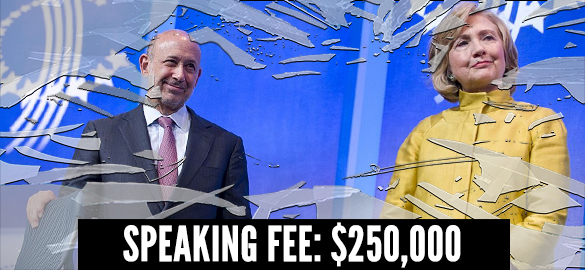 But it’s become increasingly difficult because Washington is controlling more and more. Now you can’t get your health care without going through something to do with Washington or Obama. And when you do that, you may have to take out a second mortgage on your house to afford it. It’s that bad for a lot of people. If you’re a farmer, if you’re in any number of other businesses, you simply can’t ignore Washington today. You have to go through some agency — federal, state, and local — just to live your life. The people are fed up with it, they don’t want any part of it, and they haven’t participated a long time.
But it’s become increasingly difficult because Washington is controlling more and more. Now you can’t get your health care without going through something to do with Washington or Obama. And when you do that, you may have to take out a second mortgage on your house to afford it. It’s that bad for a lot of people. If you’re a farmer, if you’re in any number of other businesses, you simply can’t ignore Washington today. You have to go through some agency — federal, state, and local — just to live your life. The people are fed up with it, they don’t want any part of it, and they haven’t participated a long time.
Here comes Trump, and Trump saying what they think, Trump represents what they wish they had enough power to go into battle with the establishment and wage a war. They don’t like the direction of the country and that is the key. There are any number of questions that pollsters ask voters, aside from their choices in candidate to try to gauge public opinion.
We’ve already had some exit poll data released today. It’s from the Morning Consult, slash, Politico. If there’s been more, I haven’t seen it, and apparently the numbers of people — it’s a huge number of people who have voted today told exit pollers that what they’re looking for in a president is a strong leader. And, by the way, Morning Consult is presenting this; they don’t think these voters voted for Hillary. Not happy about this.
There’s another question, such as, “Cares about people like me” that exit pollers ask. And in each of the last two, Obama has creamed both McCain and Romney. In Romney’s case it was 81 to 19, Obama won that question, “cares about people like me.”
Another question. And I’m told that this question, if you look at polling data historically, which we can trace back to the old Harris group back in World War I, that the most reliable indicator, generic question indicator for how people are gonna vote is the right track/wrong track question and the results to it.
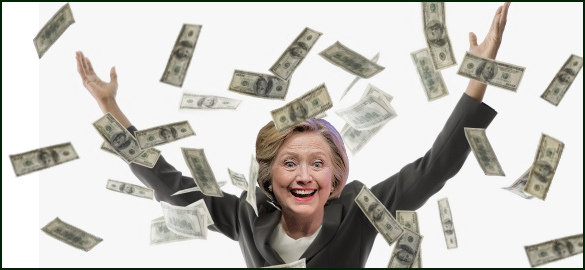 Now, we’re not hearing much. We’re hearing some. We’ve heard during this campaign a few references to people who think the country is on the wrong track, but they don’t focus on that much, and the reason is because it’s not good for Democrats right now because the Democrats are in power. And if the country’s headed in the wrong direction, in the minds of a lot of people, then that’s always a bad result for incumbents.
Now, we’re not hearing much. We’re hearing some. We’ve heard during this campaign a few references to people who think the country is on the wrong track, but they don’t focus on that much, and the reason is because it’s not good for Democrats right now because the Democrats are in power. And if the country’s headed in the wrong direction, in the minds of a lot of people, then that’s always a bad result for incumbents.
Well, the right track/wrong track question, the most recent data we have — ready for this? Let me double-check this just to make sure. Seventy percent think the country is on the wrong track. Thirty percent don’t. Thirty percent say, “We’re okay. We’re either okay or we’re headed in the right direction.” Seventy percent, wrong direction.
That question alone could be responsible for the turnout being bigger an usual, if it is. But many people are hoping that it is in that question, that answer that a Trump victory resides, right track/wrong track, coupled with voters who haven’t voted before or in a long time who may show up today who have not been accurately polled.
And again, I remind you that Pat Caddell and Doug Schoen say, “No, no, no, that can’t happen. Early voting takes away any element of such surprise. With the combination of early voting and Election Day voting, we’re gonna know, there isn’t any late-minute surprise like we had in 1980.” They say it isn’t possible because of early voting. Okay, so you look at early voting. Well, there are a few stories to see here. In both North Carolina and Florida, conventional wisdom is being stood on its head.
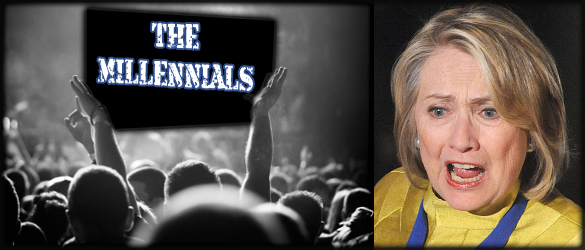 In North Carolina, early voting among ages 22 to 29 — the beloved Millennial generation — is down 66% since 2012. It is thought that it’s considered automatic, axiomatic that Millennials vote Democrat. Well, if that’s true and if Millennial turnout’s way down, it means there isn’t any Millennial enthusiasm or turnout for Hillary Clinton. In Florida, we have two different elements that are standing things upside down, and it’s just these two states so far. It could be happening elsewhere; we don’t know. It could not be happening, either.
In North Carolina, early voting among ages 22 to 29 — the beloved Millennial generation — is down 66% since 2012. It is thought that it’s considered automatic, axiomatic that Millennials vote Democrat. Well, if that’s true and if Millennial turnout’s way down, it means there isn’t any Millennial enthusiasm or turnout for Hillary Clinton. In Florida, we have two different elements that are standing things upside down, and it’s just these two states so far. It could be happening elsewhere; we don’t know. It could not be happening, either.
In Florida, the African-American vote… This is true in North Carolina, too. The African-American vote is way — early voting is way — below what it was in 2012 for Barack Hussein O. Same circumstance in Florida. African-American early voting down. Now, you’re saying, “But wait, Rush. I heard earlier this week that early voting’s way up in Florida for Hillary.” I know you’ve heard that. I’m just telling you what I’m seeing today, that early voting in Florida, African-American and Hispanic… Hispanic is what’s way up. Hispanic early voting is what’s way up.
Do you know what also is included in Hispanic turnout in Florida is Cuban. They are considered part of the Hispanic population for purposes such as this, and traditionally Cuban-American votes have gone Republican. But people say that’s changing, too, because we have the passing of new generations, a generation of younger Cuban-Americans who do not see things the way their parents and grandparents did. Over in Tampa, Pinellas County, it’s a reliable blue county, reliable Democrat county.
There’s already a 9,000 vote Republican edge. Nine thousand. It was 8,000 we took the air at noon today. Now it’s up to 9,000 more Republican votes, early votes, than in 2012 — and with party affiliation, you can assume the bulk of those are going for Donald Trump, and with numbers like that… If you’ve got… In both North Carolina and Florida, if you have Republican turnout much higher than it was in 2012, that’s where people are gonna focus and say, “See? There is a surprise turnout for Trump that nobody factored or polled,” or what have you.
 This election’s so important to so many people because of the future kind of country we’re gonna have for their kids and their grandkids. What kind of opportunities they’re going to see. The bigger government gets, the less liberty and freedom there is for citizens. That’s just the way it is. I mean, government can’t get big without taking bites of the economy. Government can’t get big without chipping away at liberty and freedom. And government is getting bigger. I mean, with Obamacare, the government just bought — just chewed up — one-sixth of the economy.
This election’s so important to so many people because of the future kind of country we’re gonna have for their kids and their grandkids. What kind of opportunities they’re going to see. The bigger government gets, the less liberty and freedom there is for citizens. That’s just the way it is. I mean, government can’t get big without taking bites of the economy. Government can’t get big without chipping away at liberty and freedom. And government is getting bigger. I mean, with Obamacare, the government just bought — just chewed up — one-sixth of the economy.
One-sixth of the private sector economy was just taken over by the federal government, and there’s no end in sight to this if Hillary Clinton wins. And as the government gets bigger, the private sector — quote, “the economy” — gets smaller. The economy is where opportunity for American citizens is. And if the pie is getting smaller. That would be historic. The great thing about America is that the economy has always grown. It’s always expanding.
And therefore getting a piece of that pie has been not easy. I mean, you’ve had to work for it. But if the pie gets smaller, then fewer people get a bite of it and the size they end up getting could be smaller. And this is what people are worried about, not to mention the encroaching liberty and freedom that’s taking place and the cultural rot that is sweeping over the country now being called normal. This is why people are hoping that there’s a giant protest against all this with turnout today for Trump.
BREAK TRANSCRIPT
RUSH: That point was made, Jay Severin is who reminded me that right track/wrong track question has been one of the historical indicators. It doesn’t always work. Sometimes the party, many people think, is responsible for the wrong track wins. There’s all kinds of variables. But traditionally it’s been a great indicator. Just in this case, nobody knows.
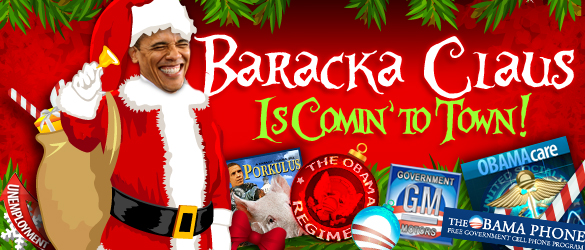 Here’s another thing. You know, if you’re looking for comparisons to 1980 — and a lot of people are. I made mention of the fact, in 1980, when you’re unemployed, you were unemployed. You didn’t have a car. You didn’t have a cell phone. Well, there weren’t any. You didn’t have a big screen. There weren’t any. You were able to eat whatever you were able to buy with your unemployment compensation that lasted for maybe six weeks or two months, and even then you had to go by and prove you were looking for work to get it.
Here’s another thing. You know, if you’re looking for comparisons to 1980 — and a lot of people are. I made mention of the fact, in 1980, when you’re unemployed, you were unemployed. You didn’t have a car. You didn’t have a cell phone. Well, there weren’t any. You didn’t have a big screen. There weren’t any. You were able to eat whatever you were able to buy with your unemployment compensation that lasted for maybe six weeks or two months, and even then you had to go by and prove you were looking for work to get it.
There wasn’t any 99 weeks. There wasn’t any year-and-a-half, two-and-a-half years of unemployment compensation and then Social Security disability and all that other stuff. I mean, if there had been 94 million Americans not working in 1980, Jimmy Carter wouldn’t have gotten one vote! But here’s the difference today: 94 million Americans are not working but they all are eating, and they’re getting unemployment checks for 99 weeks minimum. And they’re getting other benefits.
They’ve got cell phones, the Obama phones, and they maybe got their cell service that’s being compensated in part, and they’ve all got television sets. Many of them have cars. They have places to live. Being unemployed today is nowhere near what it was in 1980, and that we owe to the whole concept of Big Government and the people there. Both parties, it’s viewed for what it is. I mean, if you can be Santa Claus, if you can give people food and entertainment when they’re not working, you own ’em.
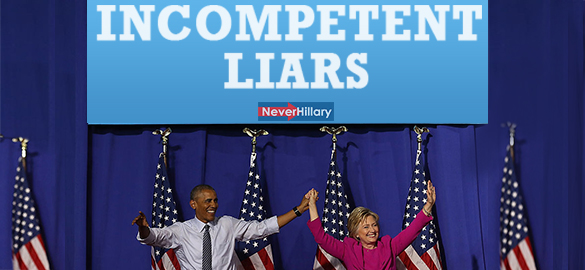 But here’s another little thing to add to it. In the most recent jobs report there were new jobs created, like 116,000. But there are always jobs lost in any unemployment reporting period. The jobs lost, according to the Department of Labor, were 9,000. But the story doesn’t end there. Yes, 9,000 people lost their jobs, but 19,000 people got jobs at the government.
But here’s another little thing to add to it. In the most recent jobs report there were new jobs created, like 116,000. But there are always jobs lost in any unemployment reporting period. The jobs lost, according to the Department of Labor, were 9,000. But the story doesn’t end there. Yes, 9,000 people lost their jobs, but 19,000 people got jobs at the government.
Government jobs are expanding like the government is. The government’s gonna grow like it is, like the Democrats want it to. It’s gotta have people who run various things that the government’s taking over and doing, like Obamacare. They don’t do it very well, but it doesn’t matter. They don’t get fired. Even when they doing it fired, they get their Thanksgiving turkeys and they get their back pay and then they get their jobs back.
So it’s vastly different, whatever the economy is now and however it’s perceived, it could be just as bad as it was in 1980, but you wouldn’t have nearly as many people thinking so ’cause they look at the affected by it. In 1980, as I say, if you were out of work, you were in trouble. All you had was your unemployment com. There might have been a couple add-ons, but it didn’t last for 99 weeks, and food stamp usage didn’t come close then to what it is now.
And even back then, the Democrats were accusing Reagan of being heartless and going over to Lafayette Park at night and stealing cans of pork and beans from the homeless! Even back then! So nothing really changes. And all of this is why there is Trump. All of this is why the Trump candidacy survived all of the things that have usually killed previous candidates, because it’s all bigger than Trump. It’s about much more than Trump.
So we’ll find out how big it is. We’re just gonna find out whether we’re outnumbered or not. And, folks, it’s really, really hard to compete against Santa Claus. And that’s how the government’s viewed by a lot of people. In fact, a lot of people think that’s what government’s for, is to take care of people. Feed people and provide for ’em, that’s what government is for. And you can’t blame ’em. That’s how they’ve been taught.


